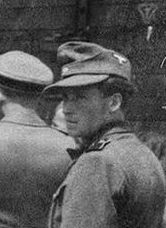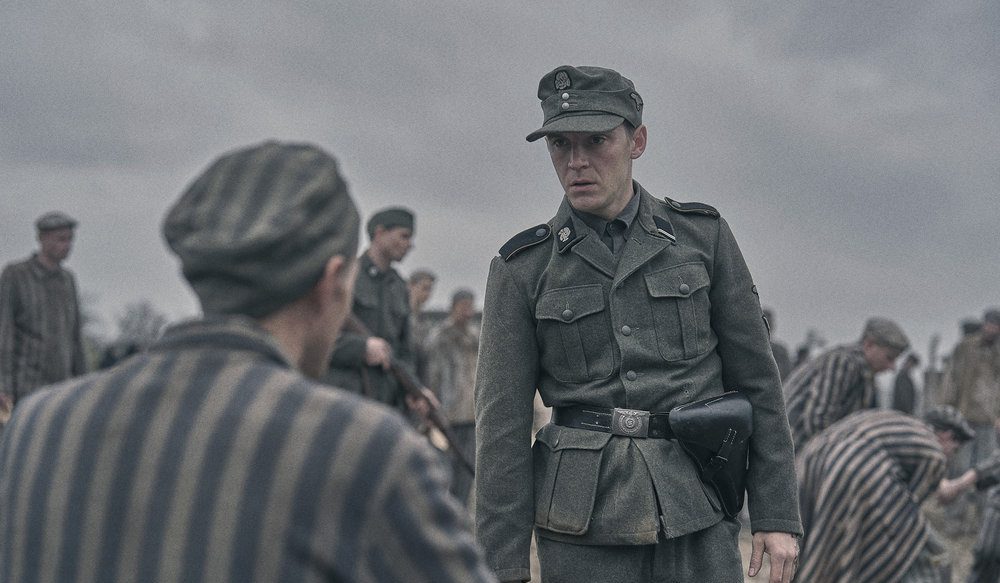In Peacock’s ‘The Tattooist of Auschwitz,’ the horrifying picture of the concentration camps under Hitler’s rule is brought to light. But even in the darkest places, hope survives for Lali Sokolov, who becomes the tattooist, when he meets another prisoner, Gita. It feels impossible for them to be together in such a place, but several things work in their favor, preventing them from death under all sorts of circumstances. They also receive help from an unlikely source: Stefan Baretzki. The guard at Auschwitz was known for his cruelty, but the Peacock series barely scratches the surface of his wrongdoings.
The Life and Crimes of Stefan Baretzki
Born in 1919 in Chernivtsi, Romania, Stefan Baretzki was the son of a telephone repairman, who died when Baretzki was nineteen. Following his education in elementary school, he started working as a stocking maker and then moved to working as a machine operator in a factory. In 1940, following Germany’s invasion of Romania, Baretzki, labeled “ethnic German,” saw a tremendous shift in his life. From his time in resettlement camps, he turned to driving for a shipping company and was drafted into the Waffen-SS in 1941. This was when he was sent to Auschwitz, where he remained till the end of the war. He was promoted to the SS squad following the evacuation of the camp.

Over the years, especially during the trial of the Nazi officers in Auschwitz, several horrifying accounts of Baretzki’s cruelty came to light. In one instance, he beat Polish prisoner Michał Liszka for “poor greeting” to the extent that the man died of a kidney injury. A witness placed him and a few other guards in the instance where eleven prisoners were killed on inspection grounds after one prisoner tried to escape and the other tried to save himself from the beating at the hands of the officers.
Baretzki was also accused of killing prisoners from a guard tower, to which he said that they were ordered to shoot the prisoners if they went near the electrified barbed wire. He was also accused of having developed a special punch that would break the prisoners’ necks and kill them. Taking his cruel streak further was the testimony of a prisoner who revealed that Baretzki had kicked a newborn baby to death, and later, his mother was also beaten up by a club and died because of it. Baretzki was also accused of knifing a prisoner after he was hanged.
Stefan Baretzki was Sentenced to Life in Prison for His War Crimes
In May 1945, Baretzki was arrested by Russian forces but released on August 17. Following the war, he went to Plaidt near Koblenz and started working at a coal store. He remained unmarried and never had any children.
His streak of violence continued, and in May 1953, he was arrested after a fight and was sentenced to 21 days in prison. In April 1955, he was fined 75 marks; in 1956, he was fined 300 marks for bodily harm. On April 12, 1960, he was taken into custody, and in December 1963, the Frankfurt Auschwitz trials began, where several survivors came forward to testify against Baretzki. After considering everything, Baretzki was sentenced to life in prison with eight additional years in August 1965.
The crimes that he was found guilty of included beating a starving prisoner to death, drowning four prisoners in a water tank, being an accomplice of the mass murder of at least 3000 people at Theresienstadt family camp, being an accomplice to the murder of 1,000 people on the Judenrampe, assisting in block selections where prisoners were selected for death with the count considered to be at least 50, shooting five prisoners to death after punishing them for performing hard labor, among others. Apart from being the defendant, Baretzki also appeared as a witness, where he testified against several SS officers, like Kurt Knittel, who Baretzki revealed told the guards that Jewish prisoners were to be killed because they were the inferior race.
Reportedly, Baretzki expressed regret and guilt for his actions. He later made an appeal, which was eventually rejected. On June 21, 1988, Baretzki died by suicide at the Konitzky-Stift in Bad Nauheim.
Read More: Cecilia “Cilka” Kovach: What Happened to the Holocaust Survivor?


You must be logged in to post a comment.